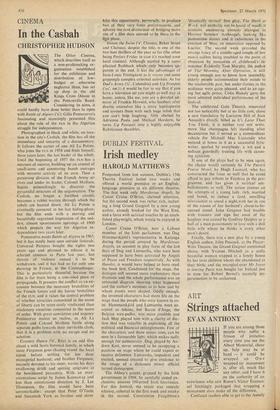CINEMA
In the Casbah
CHRISTOPHER HUDSON
\ .k,,..,.......q The Other Cinema, which describes itself as \N„.........„....
a non-profitmaking or- ganisation established for the exhibition and distribution of low- budget or otherwise neglected films, has set up shop in the old Kings Cross Odeon in the Pentonville Road. Considering its aims, it
could hardly have done better than to open with Battle of Algiers ('x'), Gillo Pontecorvo's fascinating and stunningly presented film about the role of the FIN in the Algerian struggle for independence.
Photographed in black and white, on loca- tion in the city's Casbah, the film has all the immediacy and sincerity of a documentary. It follows the career of one All La Pointe, who joins the Eli,: in 1954 and finds himself, three years later, the last leader of the rebels. Until the beginning of 1957 the FLN has a measure of success, building up an arsenal of small-arms and countering bomb outrages with terrorist activity of its own. Then a paratroop division of the French Army ar- rives and under its leader, Colonel Mathieu, begins painstakingly to discover the pyramidal structure of the organisation. The Casbah, no longer a fortified citadel, becomes a rabbit warren through which the rebels are hunted down. Ali La Pointe is eventually cornered in his last hiding-place; but the film ends with a moving and beautifully organised impression of the sud- den, almost spontaneous uprisings of 1960 which prepare the way for Algerian in-
dependence two years later. . ..
Pontecorvo made Battle of Algiers in 1965, but it has rarely been seen outside festivals. Universal Pictures bought the rights two years ago and planned to release it to selected cinemas in Paris last year, but threats of violence caused it to be withdrawn, and it has had so far only one showing in France, at the Cindmatheque. This is particularly shameful because the film is far from being a one-sided piece of propaganda. It presents the conflict as an en- counter between the necessary brutalities of the French forces and the heroic brutalities of the FLN; and it raises the central problem of whether atrocities committed in the name of liberty can be more easily vindicated than retaliatory atrocities committed in the name of order. With great conviction and urgency Pontecorvo makes us realise, as All La Pointe and Colonel Mathieu battle along separate paths towards their inevitable clash, that it is a problem with no escape and no solution.
Country Dance ('x', Ritz) is an odd film
about a wild Scots baronial family, in which sister Ferguson goes chasing round the local talent before settling for her dour managerial husband; and brother Ferguson, insanely devoted to his sister, wastes his days swallowing drift( and spitting epigrams at the bewildered peasantry. With an over- ostentatious script by James Kennaway and less than ostentatious direction by J. Lee Thompson, the film would have been unremarkable: except that Peter O'Toole and Susannah York as brother and sister take this opportunity, perversely, to produce two of their very finest performances, and achieve the rare distinction of bringing more out of a film than seemed to be there in the fipst place.
Simon the Swiss ('a', Classics, Baker Street and Chelsea), despite the title, is one of the two best thrillers of the year so far (the other being Perfect Friday in case it's reached your local cinema). Although marred by a com- plicated flashback which only becomes ap- parent at the end, it has the advantages of Jean-Louis Trintignant as le voyou and some grippingly complex criminal activities. As for Dad's Army ('u', Columbia) and Up Pompeii (' AA', AKA) it would be fair to say that if you have a television set you might as well stay at home; unless, like me, you are a devoted ad- mirer of Frankie Howerd, who lumbers after double entendres like a crazy lepidopterist and savours them with such huge relish that you can't help laughing. Ably abetted by Adrienne Posta and Michael Hordern, he turns Up Pompeii into a highly enjoyable Rabelaisian shambles.










































 Previous page
Previous page